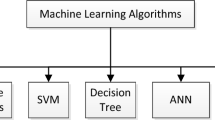Abstract
In the context of the ongoing COVID-19 pandemic, the need for robust health monitoring systems has become increasingly evident, especially for at-risk patients. The latter refers to individuals who are more susceptible to severe illness or complications if infected with COVID-19 due to underlying health conditions, age, or other factors. To address this need, the proposed research aims to develop an intelligent health monitoring system called AI-LMS (AI-based Long-term Monitoring System) that focuses on patients in pandemics. The system will utilize IoMT (Internet of Medical Things) sensors, Machine Learning algorithms, and Mobile Cloud Computing to enable real-time identification and monitoring of at-risk patients. The suggested approach can be simply adaptable for use in various pandemic circumstances. Using COVID-19 as a case study, AI-LMS underscores the significance of robust health monitoring systems in pandemic conditions. It is separated into two phases: the first collects and processes health data using a multi-layer classifier to identify at-risk patients, whereas the second one is centered on monitoring at-risk patients with the help of IoMT sensors that provide data to a machine learning model. The model alerts healthcare professionals to any concerning trends. By making slight modifications, this research aims to design efficient health monitoring systems for pandemic situations, ultimately leading to improved patient outcomes and alleviating the burden on healthcare systems.
Access this chapter
Tax calculation will be finalised at checkout
Purchases are for personal use only
Similar content being viewed by others
References
Alonso, S.G., et al.: Telemedicine and e-health research solutions in literature for combatting Covid-19: a systematic review. Heal. Technol. 11, 257–266 (2021)
Asrani, P.: Mobile cloud computing. Int. J. Eng. Adv. Technol. 2(4), 606–609 (2013)
Bhardwaj, V., Joshi, R., Gaur, A.M.: IoT-based smart health monitoring system for Covid-19. SN Comput. Sci. 3(2), 137 (2022)
El-Rashidy, N., El-Sappagh, S., Islam, S.R., El-Bakry, H.M., Abdelrazek, S.: End-to-end deep learning framework for coronavirus (Covid-19) detection and monitoring. Electronics 9(9), 1439 (2020)
El-Sherif, D.M., Abouzid, M., Elzarif, M.T., Ahmed, A.A., Albakri, A., Alshehri, M.M.: Telehealth and artificial intelligence insights into healthcare during the Covid-19 pandemic. Healthcare 10(2) (2022). https://doi.org/10.3390/healthcare10020385. https://www.mdpi.com/2227-9032/10/2/385
Garets, D., Davis, M.: Electronic medical records vs. electronic health records: yes, there is a difference. Policy white paper. Chicago, HIMSS Analytics, pp. 1–14 (2006)
Jaber, M.M.: Remotely monitoring Covid-19 patient health condition using metaheuristics convolute networks from IoT-based wearable device health data. Sensors 22(3), 1205 (2022)
Janiesch, C., Zschech, P., Heinrich, K.: Machine learning and deep learning. Electron. Mark. 31(3), 685–695 (2021)
Kok, J.N., Boers, E.J., Kosters, W.A., Van der Putten, P., Poel, M.: Artificial intelligence: definition, trends, techniques, and cases. Artif. Intell. 1, 270–299 (2009)
Lancet, T.: Covid-19: fighting panic with information. Lancet (London, England) 395(10224), 537 (2020)
Mirashe, S.P., Kalyankar, N.V.: Cloud computing (2010)
Nasser, N., Emad-ul Haq, Q., Imran, M., Ali, A., Razzak, I., Al-Helali, A.: A smart healthcare framework for detection and monitoring of Covid-19 using IoT and cloud computing. Neural Comput. Appl. 1–15 (2021)
Ongsulee, P.: Artificial intelligence, machine learning and deep learning. In: 2017 15th International Conference on ICT and Knowledge Engineering (ICT &KE), pp. 1–6. IEEE (2017)
Otoom, M., Otoum, N., Alzubaidi, M.A., Etoom, Y., Banihani, R.: An IoT-based framework for early identification and monitoring of Covid-19 cases. Biomed. Signal Process. Control 62, 102149 (2020)
Patel, K.K., Patel, S.M., Scholar, P.: Internet of things-IoT: definition, characteristics, architecture, enabling technologies, application & future challenges. Int. J. Eng. Sci. Comput. 6(5) (2016)
Rajan Jeyaraj, P., Nadar, E.R.S.: Smart-monitor: patient monitoring system for IoT-based healthcare system using deep learning. IETE J. Res. 68(2), 1435–1442 (2022)
Razdan, S., Sharma, S.: Internet of medical things (IoMT): overview, emerging technologies, and case studies. IETE Tech. Rev. 39(4), 775–788 (2022)
Rong, G., Mendez, A., Assi, E.B., Zhao, B., Sawan, M.: Artificial intelligence in healthcare: review and prediction case studies. Engineering 6(3), 291–301 (2020)
Sakly, H., Said, M., Al-Sayed, A.A., Loussaief, C., Sakly, R., Seekins, J.: Blockchain technologies for internet of medical things (BIoMT) based healthcare systems: a new paradigm for COVID-19 pandemic. In: Sakly, H., Yeom, K., Halabi, S., Said, M., Seekins, J., Tagina, M. (eds.) Trends of Artificial Intelligence and Big Data for E-Health. IS, vol. 9, pp. 139–165. Springer, Cham (2022). https://doi.org/10.1007/978-3-031-11199-0_8
Sheth, H.S.K., Tyagi, A.K.: Mobile cloud computing: issues, applications and scope in COVID-19. In: Abraham, A., Gandhi, N., Hanne, T., Hong, T.-P., Nogueira Rios, T., Ding, W. (eds.) ISDA 2021. LNNS, vol. 418, pp. 587–600. Springer, Cham (2022). https://doi.org/10.1007/978-3-030-96308-8_55
Talukder, A., Yavagal, R.: Mobile Computing. McGraw-Hill, Inc. (2006)
Author information
Authors and Affiliations
Corresponding author
Editor information
Editors and Affiliations
Rights and permissions
Copyright information
© 2024 The Author(s), under exclusive license to Springer Nature Switzerland AG
About this paper
Cite this paper
Zendaoui, N., Bouchemal, N., Benabdelhafid, M. (2024). AI-LMS: AI-Based Long-Term Monitoring System for Patients in Pandemics: COVID-19 Case Study. In: Mosbah, M., Kechadi, T., Bellatreche, L., Gargouri, F. (eds) Model and Data Engineering. MEDI 2023. Lecture Notes in Computer Science, vol 14396. Springer, Cham. https://doi.org/10.1007/978-3-031-49333-1_20
Download citation
DOI: https://doi.org/10.1007/978-3-031-49333-1_20
Published:
Publisher Name: Springer, Cham
Print ISBN: 978-3-031-49332-4
Online ISBN: 978-3-031-49333-1
eBook Packages: Computer ScienceComputer Science (R0)




